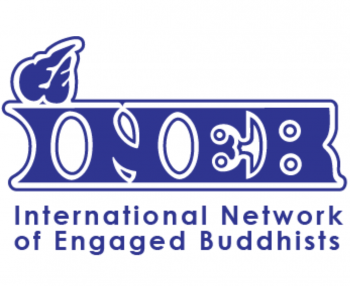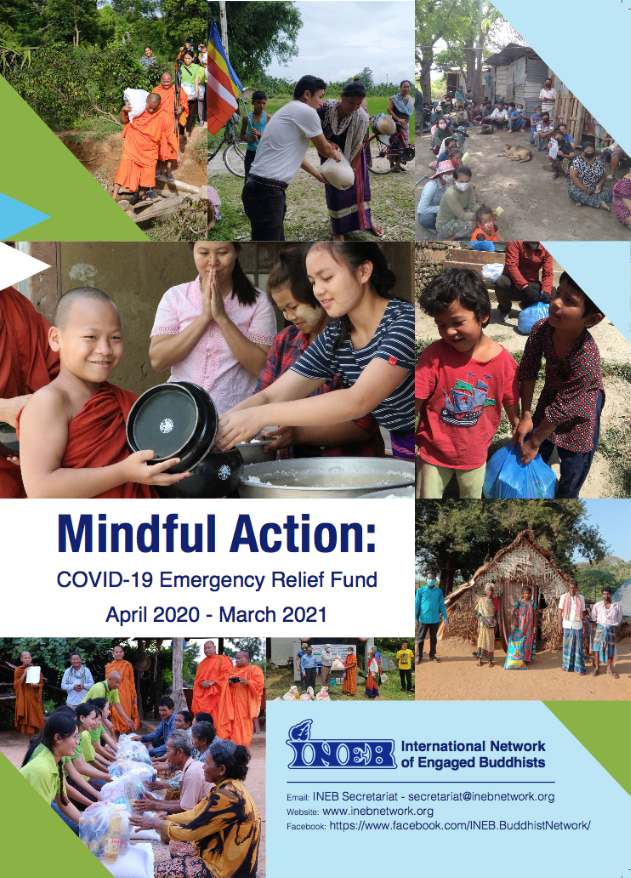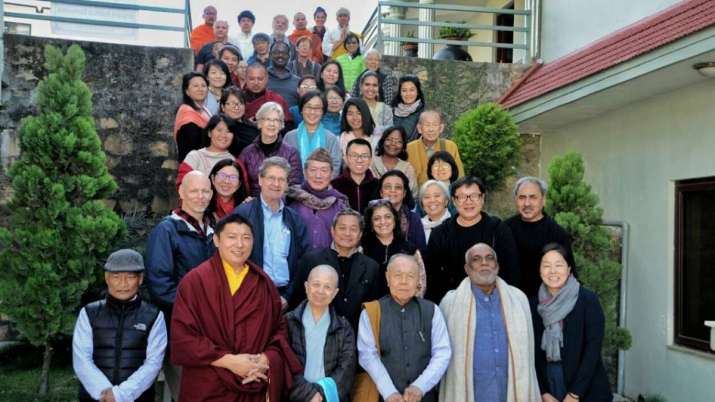The International Network of Engaged Buddhists (INEB) has published the final report for its Mindful Action: COVID-19 Emergency Relief Fund, which ran from April 2020 through March 2021. The relief fund was aimed at providing a grassroots emergency response in support for the most vulnerable groups in countries within the INEB network, specifically in South and Southeast Asia.
INEB has initiated a wide range of educational projects and social outreach programs across the region. Early last year, in response to the unfolding SARS-CoV-2 pandemic, the organization launched the Mindful Action: COVID-19 Emergency Relief Fund, aiming to bring urgently needed relief to vulnerable and underprivileged communities during the growing global coronavirus crisis.*
“We launched the Mindful Action: COVID-19 Emergency Relief Fund to support emergency relief efforts in Bangladesh, Cambodia, India, Myanmar, and Nepal—countries with the greatest need during this time of crisis,” said INEB Executive Secretary Somboon Chungprampree.

Coordinating closely with partner organizations on the ground in each of these countries, which have been working with local communities for many years, INEB was able to deliver basic necessities and relief aid, such as food staples, hygiene supplies, and medical aid, to some of the most marginalized and vulnerable communities—those lacking any kind of safety net or social and economic support systems.
INEB’s published report includes five national maps accompanying in-depth descriptions highlighting the emergency relief activities carried out by INEB and its partners. The paper details the genesis of the initiative and provides a breakdown of the many beneficiaries and the ways in which the relief efforts and resources were distributed.

Somboon Chungprampree
“The Mindful Action: COVID-19 Emergency Relief Fund was INEB’s first experience in collaborating broadly on an emergency relief effort of this size, which was possible through the trust, strength, and responsiveness of our entire network,” Somboon told Buddhistdoor Global. “The focus was for our implementing partners to reach communities most in need in five countries: Bangladesh, Cambodia, India, Myanmar, and Nepal. We understand that the Mindful Action funds contributed to a much more expansive relief effort and that our partners’ activities provided a critical intervention as the pandemic unfolded.”
In setting up the relief fund, INEB worked closely with donors Arigatou International in Japan; Buddhist Hongshi College, Taiwan; Clear View Project, in the US; Join Together Society, Korea; as well as many anonymous and small donors. Partner organizations on the ground included: the Atish Dipankar Society (ADS) and the Parbatya Bouddha Mission (PBM) in Bangladesh; Preah Sihanouk Raja Buddhist University, Battambang Branch (SBUBB) in Cambodia; the ADECOM Network, the Nagarjuna Training Institute, the Foundation of His Sacred Majesty (FHSM), and the Siddhartha’s Intent Society in India; the Kalyana Mitta Development Foundation (KMDF) and the Phaung Daw Oo (PDO) Monastic Education High School in Myanmar; and the Bikalpa Gyan Tatha Bikas Kendra and the Chokgyur Lingpa Foundation (CGLF) in Nepal.

“We recognize the members of our global network, all the donors, and the mindful action partners in five countries that worked tirelessly to distribute emergency relief under difficult conditions,” INEB said. “We appreciate that this endeavor was actually carried on the shoulders of many local people to ensure that their communities had food and other relief supplies to sustain them during this crisis.”
INEB’s full report can be accessed here.
At the time of writing on 23 April, global confirmed SARS-CoV-2 coronavirus infections were reported to be approaching 145 million globally, with 3.07 million deaths so far recorded and 83.2 million people recovered.**

INEB was established in Thailand in 1989 by the prominent Thai academic, activist, and social critic Sulak Sivaraksa, with a group of Buddhist and non-Buddhist thinkers and social activists. The organization was formed with the aim of connecting engaged Buddhists around the world to promote understanding, cooperation, and networking among inter-Buddhist and inter-religious groups, and to address global issues such as human rights, conflict resolution, and environmental crises. INEB’s members include monks, nuns, social workers, and academics from more than 25 countries in Asia, Australasia, Europe, and North America, working together under the umbrella of kalyana-mitrata.***
While founded in and motivated by the Buddhadharma, INEB welcomes members from other spiritual traditions and recognizes the importance of interfaith activities, stating: “INEB’s philosophy and practice is based on compassion, social justice, non-violence, and co-existence as put forth by Gautama the Buddha. The network’s core mission is to confront and end suffering using analysis and action guided by the Four Noble Truths.” (INEB)
* International Network of Engaged Buddhists Launches COVID-19 Emergency Relief Fund (Buddhistdoor Global)
INEB Issues Public Statement for a Compassionate Global Response to the Coronavirus Crisis (Buddhistdoor Global)
Buddhist Responses to COVID-19: INEB Joins Dialogue on Global Faith Engagement (Buddhistdoor Global)
** Johns Hopkins University & Medicine Coronavirus Resource Center
*** Kalyaṇa-mittata (Pali) kalyaṇa-mitrata (Skt.), the Buddhist concept of spiritual friendship.
See more
International Network of Engaged Buddhists
Statement Concerning the COVID-19 Pandemic from the International Network of Engaged Buddhists (INEB) (INEB)
INEB – International Network of Engaged Buddhists (Facebook)












